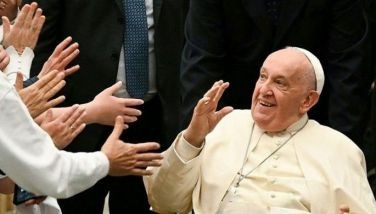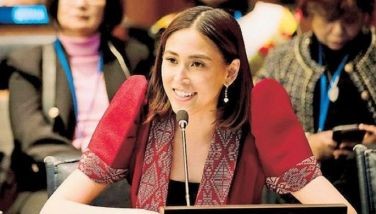‘Celebrate freedom from dictatorship’
BERLIN – “There can be no tyrants where there are no slaves.”
Quoting national hero Dr. Jose Rizal, President Aquino called on Filipinos to celebrate freedom from dictatorship as the government strives to make every citizen truly free – first and foremost from hunger and poverty.
“In our generation, we have re-articulated this challenge in a battle cry that resonated in our last presidential elections wherein we said, ‘Where there is no corruption, there is no poverty’,” Aquino said at the policy forum organized by Koerber Stiftung and Asia Pacific Committee of German Business here on Friday.
On Sept. 21, 1972, then president Ferdinand Marcos placed the Philippines under martial law. Martial law was announced officially two days later on Sept. 23.
“We have gone a long way in the past few decades. In 1986, my mother, Corazon Aquino was catapulted to the presidency through the bloodless EDSA People Power Revolution. Just three years after that, she visited Germany in July of 1989; a few months later, the Berlin Wall fell,” he said.
“It was a time when our two countries, both having suffered through dictatorships, could recognize and celebrate the values that we share: freedom, democracy and the rule of law,” he said.
He said the Berlin Wall symbolized the difference between the western democrats and the eastern communists and the way they thought Germany should be led.
It also symbolized the inner conflict of Germany and the division between “free” or democratic, he said.
Marcos, who stayed in office for more than 20 years – from 1965 to February 1986 – explained that martial law was intended to suppress civil strife and the threat of communist takeover following a series of bombings in Manila.
“Just one generation removed from my mother’s visit, the Philippine resurgence is now in full swing. The empowerment of the people in 1986, most profoundly manifested then in our newfound freedoms, now finds new meaning in the economic empowerment being engendered in our society,” Aquino said.
“We have recovered from the scourge of the dictatorship and from periods of self-serving leadership, and have fostered a positive shift in the national psyche,” he said. “Optimism among the Filipino people and the international community is very high, opportunities are expanding, and our government continues to move towards progress with the interest of the Filipino people as its North Star,” he noted.
He said his administration has never wavered in its commitment to restore and maintain the principles of transparency and accountability in government.
“From the beginning of my term, we have stayed true to our promise. We have brought the moral imperatives of justice, transparency and accountability back into the equation of governance,” he said.
“We have plugged bureaucratic leakages and strengthened public institutions. A good example of our reform efforts is our overhaul of the Philippine budgeting process. Our administration has adopted what we call the zero-based budgeting, which involves reviewing all government projects, axing the ones that provided little to no benefit to our countrymen, while keeping and even strengthening the ones that had great positive effect,” Aquino said.
“We pursued all those who committed wrongdoing, regardless of their wealth or influence. When evidence of plunder and electoral sabotage were found against my predecessor in the presidency, corresponding charges were filed, and now, she is under hospital arrest, waiting to face due process of our court systems,” he said, referring to former President and now Pampanga congresswoman Gloria Macapagal-Arroyo.
He also cited as proof of his administration’s resolve in fighting corruption the ouster of a chief justice for failing to properly declare his wealth in his Statement of Assets and Liabilities and Net Worth.
“These instances, among others, sent a clear message: The rule of law applies to all,” he said.
Aquino also enumerated the programs and projects of his administration to improve people’s lives, pointing out that funds for social services were significantly increased.
He said the people were the Philippines’ greatest resources, thus the need to provide them with better education, health and other services.
Aquino said their efforts were paying off, judging from the country’s improving economy.
Aquino also noted that Rizal was only 27 years old when he wrote the “Noli Me Tangere” here and had it published on March 21, 1887.
Rizal spent two years in Germany. “Short on funds, he rationed his biscuits for meals; to stave off loneliness, he wrote poems about the flowers of Heidelberg, translated Schiller’s ‘William Tell’ into his native Tagalog, and drew ideas from Berlin’s libraries,” he said.
Aquino said the Noli “offered a candid look at the ills of Filipino society under colonial rule. It shed light on the abuses of the colonizers, and on our people’s collective longing for freedom and dignity.”
“Scholars consider it the first articulation of a Filipino national consciousness. The novel eventually earned the ire of the authorities. After some time in exile, Dr. Rizal would be arrested and martyred by firing squad on the 30th of December, 1896,” Aquino said.
Aquino said Rizal’s ideas, works and, ultimately, his death, sparked a revolution for Philippine independence.
In Manila, Vice President Jejomar Binay asked his fellow martial law activists to keep the fight for freedom alive.
Binay, who was a human rights lawyer during the Marcos regime, said it is important to preserve the rule of law and constitutional order if the country wishes to preserve its liberty.
“For those who struggled against the dictatorship and survived its repressive machinery, our greatest challenge is to keep the fight for freedom alive, especially among the younger generation,” Binay said.
Binay cited in particular the need to preserve the independence of the judiciary.
“Of paramount importance is preserving the rule of law and constitutional order, especially the independence of our judiciary from the intrusion of influence of the executive,” he said.
“We must fight to preserve the ideals of democracy as enshrined in our Constitution from all efforts to weaken the system of checks and balances and fortify the power of one branch over the other co-equal branches, a system that brought about the abuses of martial law,” Binay said. – Aurea Calica, Jose Rodel Clapano
- Latest
- Trending






























